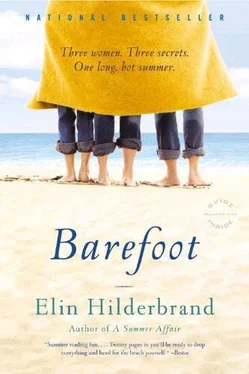Elin Hilderbrand - Barefoot - A Novel
Здесь есть возможность читать онлайн «Elin Hilderbrand - Barefoot - A Novel» весь текст электронной книги совершенно бесплатно (целиком полную версию без сокращений). В некоторых случаях можно слушать аудио, скачать через торрент в формате fb2 и присутствует краткое содержание. Жанр: Старинная литература, на английском языке. Описание произведения, (предисловие) а так же отзывы посетителей доступны на портале библиотеки ЛибКат.
- Название:Barefoot: A Novel
- Автор:
- Жанр:
- Год:неизвестен
- ISBN:нет данных
- Рейтинг книги:4 / 5. Голосов: 1
-
Избранное:Добавить в избранное
- Отзывы:
-
Ваша оценка:
- 80
- 1
- 2
- 3
- 4
- 5
Barefoot: A Novel: краткое содержание, описание и аннотация
Предлагаем к чтению аннотацию, описание, краткое содержание или предисловие (зависит от того, что написал сам автор книги «Barefoot: A Novel»). Если вы не нашли необходимую информацию о книге — напишите в комментариях, мы постараемся отыскать её.
Barefoot: A Novel — читать онлайн бесплатно полную книгу (весь текст) целиком
Ниже представлен текст книги, разбитый по страницам. Система сохранения места последней прочитанной страницы, позволяет с удобством читать онлайн бесплатно книгу «Barefoot: A Novel», без необходимости каждый раз заново искать на чём Вы остановились. Поставьте закладку, и сможете в любой момент перейти на страницу, на которой закончили чтение.
Интервал:
Закладка:
“What?”
“This guy, Feldman? He cal ed the university and they gave him my name, as your attorney.”
“Feldman?” Brenda said. In the end, she hadn’t sent her screenplay to Ron Feldman or anyone else at Marquee Films. Because after that horrible phone cal , what was the point?
“Yeah. I guess he borrowed his daughter’s copy of the book and he liked it and he wants to see your screenplay. He was very clear that he makes no promises. I guess Marquee is already doing something similar, a book by some guy named George Eliot, more of that old-time shit, but he did like the Fleming Trainor, he said, and he wants to see the script. You know, I sort of got the impression he thought I was your agent .”
“So what did you tel him?”
“I told him the script was out with various studio execs, we had lots of interest, but that we would keep him in the loop before we made any decisions.”
“You’re kidding me,” Brenda said. “God, I cannot believe this.”
“He makes no promises, Brenda. In fact, he said even if he did option it, it might molder for years, unproduced. I asked him what his bal park was for an option, and he made it clear it was five figures, not six, so don’t go jumping over the moon.”
When Brenda hung up, she threw her arms around Walsh’s neck. “Feldman wants to see it. He makes no promises, but he does want to see it.”
This was good news, not great news, not the best news, but not bad news either. For the first time al summer, Brain Delaney, Esquire, had cal ed without bad news.
Brenda rested her head against Walsh’s sturdy Australian shoulder as the taxi barreled down Milestone Road toward the airport. She was already over the moon.
EPILOGUE
WINTER
Al over the world, mothers are dying, but at eleven o’clock on the morning of January 29, a mother is born. Melanie Patchen delivers a baby girl, Amber Victoria, weighing eight pounds even and measuring twenty inches long. Healthy.
When the nurses wheel Melanie out of recovery (after eighteen hours in labor, an epidural, a shot of Pitocin, and a distressed heartbeat, the doctors performed a C-section), Melanie is able to hold her daughter and nurse her for the first time, and she feels like the world is brand-new; she feels like she is seeing everything for the first time.
When she conveys this feeling to Peter, he says, “That’s the morphine talking.”
I have a baby, Melanie thinks. This baby is mine . I’m her mother .
Melanie becomes mesmerized by the impossible smal ness of Amber’s every feature—her smal mouth, her tiny ears, her fingers and toes, her beating heart the size of an egg. The baby cries, she opens her eyes and turns her head toward sound, she roots against Melanie until she latches onto a nipple. Melanie feels an explosive, protective, overwhelming love. She wants to tel everyone about this new love, how it puts everything else into perspective. But what she quickly discovers is that the world fal s into two categories: those who don’t care and those who already know.
For three days straight, flowers arrive. There are orchids from Vicki and Ted, pink roses from Melanie’s parents, a cyclamen from Peter’s mother in Paris, an embarrassingly lavish and funereal arrangement from “the gang at Rutter, Higgens,” red gerbera daisies from Melanie and Peter’s neighbors, a potted chrysanthemum from Brenda Lyndon and John Walsh, forced paperwhites from Melanie’s col ege roommate . . . the flowers keep coming until the nurses start to joke about Melanie being “quite the popular one.” Melanie sends the next three arrangements over to the cancer ward.
On the afternoon of the fourth day, when Melanie is nursing Amber in bed, more flowers arrive. The arrangement is modest, sparse even. It’s tea roses and carnations, a few sprays of baby’s breath; it comes in a mug that says Mommy and has a pink, heart-shaped Mylar bal oon attached.
“Another one,” the nurse says. It’s Stephanie, Melanie’s favorite nurse, the head of Labor and Delivery. She is blond and pretty, kind and capable; she was with Melanie through the last part of her labor and her C-section and she has done most of the teaching—how to feed and burp the baby, how to give her a sponge bath, how to clean around the umbilical cord.
Melanie smiles. “And here I thought everyone had forgotten about me.”
“Apparently not,” Stephanie says. She sets the mug down on Melanie’s meal tray. “Would you like me to read you the card?”
Melanie studies the flowers. What she realizes is that she’s been waiting for flowers just like this: inexpensive but earnest. Easily purchased online.
“No, thanks,” Melanie says. “It’l give me something to look forward to when I’m done feeding her.”
“You’re doing a great job, by the way,” Stephanie says. “The baby’s already back up to her birth weight. That’s what we like to see.”
Melanie gazes down at Amber’s soft head, covered with dark fuzz. Stephanie leaves the room.
Later, when the baby is asleep in her bassinet, Melanie removes the envelope from the prongs of the plastic fork sticking out of the arrangement.
Melanie Patchen, the envelope says.
Peter is picking up his mother at JFK; Melanie expects them at dinnertime.
She takes out the card. It says: I know she’s beautiful.
Melanie’s eyes flood with tears, and in an instant, she is sobbing. Stephanie had told her to expect this—sudden tears, for no apparent reason.
Her hormones are al over the place. Melanie looks first at her baby sleeping and then out the window—the late-afternoon sky is gray and there are snow flurries. In the hal way, Melanie can hear strains of Muzak. She has just given birth to a gorgeous, healthy baby, and yet al she can do is cry, cry until she is struggling to catch her breath. She is back together with Peter; they are a couple again. Al she can do is hope; she likens her marriage to the New Dawn roses that hung on the front of Number Eleven Shel Street. If you cut them back, Melanie had told Blaine, they’ll be even lovelier next time. Melanie is fil ed with love and joy and wonder, and yet, she is empty. She has everything she ever wanted, but she longs for
. . .
For what?
For summertime. For an hour on a sunny deck, for a perfect slice of tomato, for the song of the wren that perched outside her window, for the way her body felt when it was cradled by the ocean’s waves, for a perfect blue hydrangea hanging over a white picket fence, for butterflies and bumblebees, for ice-cream cones after dinner, for the passenger seat of the Jeep. How intoxicating it had felt to ride down Milestone Road with the windows open and the night air rushing in, how quickening to pul up to the beach and see the water before them and the night sky spread out like a blanket, how lucky she had felt simply to sit beside someone as extraordinary as Josh Flynn.
Melanie wipes her tears and reads the card again. (She wil read it every day at first and then only on days when she needs a lift, when she needs a reminder of happiness.)
I know she’s beautiful.
The card is unsigned.
Today, Vicki’s list runs two pages long. It’s a Thursday in early February, and it also happens to be Blaine’s fifth birthday. Vicki is throwing a party that afternoon at four o’clock at Chuck E. Cheese’s. This is the venue Blaine ardently lobbied for, and Vicki acquiesced, as it conveniently placed the chaos outside the house. Stil , there are bal oons to pick up as wel as the cake and presents. There is a Valentine’s Day charity auction on Saturday night, and Vicki had hoped to get into the city to shop for something to wear (everything she has is too big; she stil hasn’t recouped from her weight loss), but the shopping wil have to wait, as wil the hundred other things on her list. The birthday party is important, yes, but there is something else in the early part of Vicki’s day that’s even more important.
Читать дальшеИнтервал:
Закладка:
Похожие книги на «Barefoot: A Novel»
Представляем Вашему вниманию похожие книги на «Barefoot: A Novel» списком для выбора. Мы отобрали схожую по названию и смыслу литературу в надежде предоставить читателям больше вариантов отыскать новые, интересные, ещё непрочитанные произведения.
Обсуждение, отзывы о книге «Barefoot: A Novel» и просто собственные мнения читателей. Оставьте ваши комментарии, напишите, что Вы думаете о произведении, его смысле или главных героях. Укажите что конкретно понравилось, а что нет, и почему Вы так считаете.












